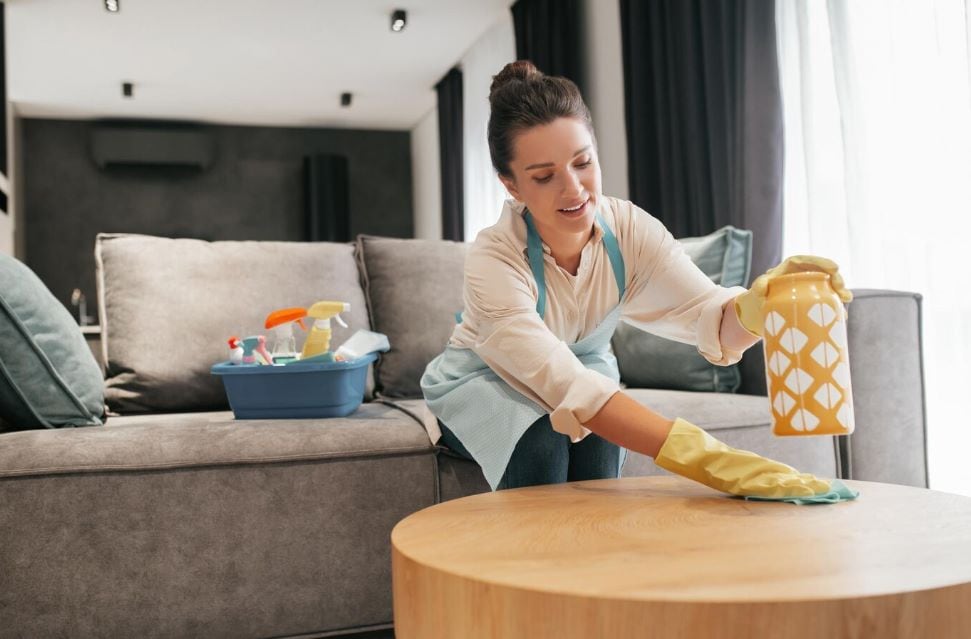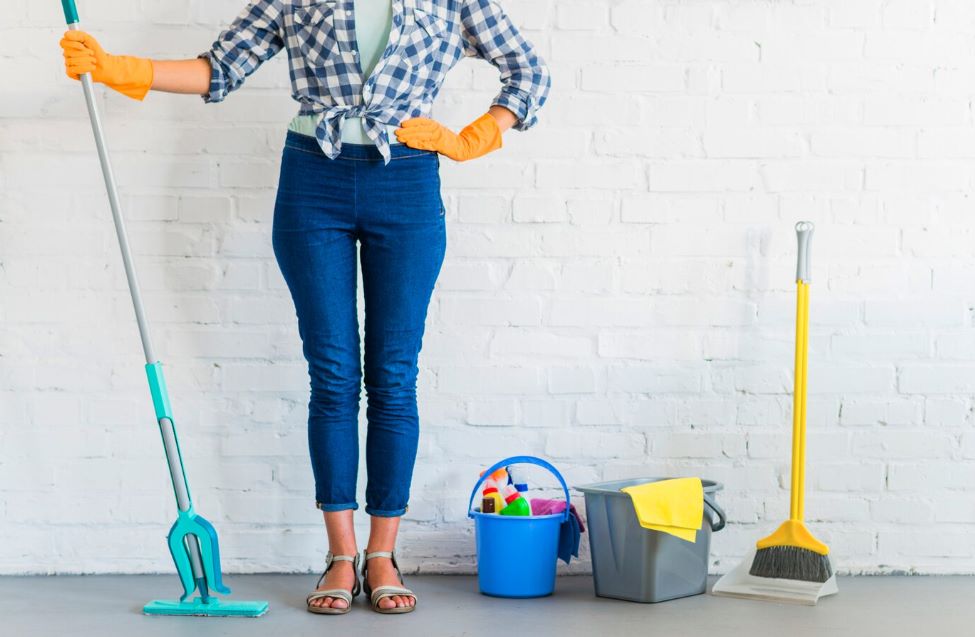It's easy to mess up a clean space, even when using high-quality equipment and all-natural cleaning supplies. We don't all come out of the womb knowing how to clean like pros, and that's just fine.
No one is perfect, so don't feel bad if you think your cleaning habits may be better. Better cleaning habits can be developed through trial and error. Consider the following advice to improve your cleaning practice and get better results.
Mistakes to Avoid When Cleaning
If you commit any of these frequent blunders while deeply cleaning your home, your efforts will be for naught.
Remember these tips the next time you have a major cleaning task ahead of you, whether it's a one-time spring cleaning or your everyday chore.
Cleaning Too Quickly
We all want things to get along as quickly as possible, and there are many effective cleaning methods, but some things cannot be compromised.
Spring cleaning is one of those tasks that, if rushed, nearly always leads to regret. It would help if you didn't rush to do a task calling for your undivided attention.
Please don't rush through deep cleaning; doing it perfectly the first time will reduce the time you need to fix your mistakes.
Not Keeping To A Regular Cleaning Routine
Taking your time is essential, but you should keep moving slowly when cleaning, lest you lose motivation and stop before you're through.
Maintain a cleaning regimen as well. If you don't commit to at least a rough timetable, you'll quickly become discouraged by the lack of progress and stressed out by the chaos.
Keep yourself inspired in every way you can, and the positive effects of your efforts will carry you even further.
Skipping Dishwasher Cleaning
The dishwasher is responsible for one of the most labour-intensive tasks in your home. The food you and your family eat will also be in direct contact with whatever it cleans.
Without regular maintenance, this gadget will quickly grow hazardous germs and other creatures. Also, check to see that the dishwasher has been properly cleaned.
Make it a habit to unload the dishwasher and run a cleaner through it once a month. It will keep your dishwasher's inner workings clean, smelling fresh, and in good repair.
Cleaning Your Home All By Yourself
It takes more than one person to accomplish some cleaning tasks. If you want to engage the whole family in spring cleaning, there is a better time.
Inspire everyone in the house to help and prepare separate lists. At the very least, they should collaborate on their bedrooms and common areas.
If you are single and living alone, reach out to loved ones to see if anyone is willing to lend a hand.

Cleaning The Floor First
This may seem like a no-brainer, but it's amazing how many people overlook this.
Cleaning the floor first wastes time because the dust and filth will fall back onto it when you move the furniture.
Making a Complicated Issue More So
Housekeeping is not an advanced science. Create your cleaning checklist by following a cleaning plan and adding items specific to your home. If you stick to the fundamentals, you should be able to achieve your goal.
And while we're on the topic of unnecessary complexity, you don't need to buy every cleaning product, tool, scour, spray, etc., that has ever been created.
They can be quite useful at times, but also a waste of money for others. Don't drop cash on new gadgets if you won't use them or if the time they'll save isn't worth the money.
Without Gloves Cleaning
Anyone, especially those with sensitive skin, should wear gloves when cleaning.
You shouldn't expose your skin to harmful substances; certain cleaning products are that harsh. Use sunscreen regularly.
If you can, switch to green cleaning products like vinegar and baking soda. Even all-natural products can cause dry skin.
Lack of Preparation
Picture this: you've decided to clean, you've gotten yourself dressed for the chore, you've put on some lively music to get you in the mood (even if cleaning isn't your thing), and you've even rolled up your sleeves, but then you realise you're missing some crucial piece of equipment.
If you stick to your standard procedure list, you'll always remember what tools you need to do your work. You should obtain it in advance to start cleaning without any delays.
Appliance Cleaning Mistakes That Everyone Makes
Possible Faults with Your Refrigerator
You Overpack
There may be better ideas than stocking your fridge (or freezer to the brim. If you want your refrigerator to work properly (and keep your food chilled), give it some breathing room. Food in your refrigerator could spoil quickly if you don't have it. Make sure to leave the space on the shelves. It would help if you had no trouble getting to the back of the fridge. If not, it's probably time to get rid of some stuff. These glass containers are ideal for storing and separating everything from leftovers to fresh produce.
The Door Is Not Properly Sealed
There is nothing standard about a refrigerator door. When closed, a rubber gasket seals the body, preventing warm air from escaping and cold air from leaking. When you try to open it again, you could feel some resistance because it's magnetised. When you overstuff your refrigerator or load up the door shelves, that's when problems arise. Even though it appears to be closed, chilly air might still seep through. After closing the door, gently tug it to ensure it is completely locked.
Turning The Thermostat Down Too Far Is A Bad Idea.
Letting the cool air out when you're putting away the goods is unsettling. Due to the cool air loss, you "temporarily" lower the refrigerator's temperature when the door is propped open. That's good, but it's easy to overlook, and then your refrigerator wastes even more energy than usual, your milk gets ice crystals in it, and your produce ends up in the compost instead of the fridge.
Not Enough Cleaning Has Been Done
The refrigerator is a breeding ground for leaks and other accidents. We may tidy up the most blatant spills, but we usually only thoroughly clean the refrigerator sometimes. Keep your fridge clean as part of your "kitchen cleaning" routine since hazardous bacteria from a minor meat leak might infect other items you may not cook.
The Food You Added Was Way Too Hot
Most refrigerators can handle a hot soup but not a few warm leftover portions. The increased airflow helps to rapidly chill food, keeping the refrigerator at an appropriate temperature.
Mistakes You Shouldn't Make With Your Microwave
Accidentally Relocating The Microwave.
Whether it's beneath the bench or tucked into a cabinet, the microwave has its own special home in today's kitchens, and its optimal placement is determined by how frequently you use it and how much counter space you have available.
Having Your Meals Exposed
Always using a microwave-safe plastic wrap, lid, or paper will prevent food from exploding in the microwave.
Not Giving It A Thorough Cleaning.
Have you ever left a mess in the microwave, telling yourself you'll get to it later? A serious faux pas indeed.
The microwave's cooking time will increase since it must prepare both the food and the leftovers. If there is a spill, immediately wipe it with warm soapy water.
Leaving splatters in the microwave will lengthen the cooking time since the microwave will cook the residue in addition to the food.
In the event of accumulated dirt and oil, three minutes on high in the microwave with lemon slices and water should do the trick. Let the steam work for five minutes with the door closed to release the grime, and then wipe the inside down with a microfiber cloth.

Incorrectly Thawing Frozen Beef
It's one of the most common ways to misuse a microwave oven. The only thing worse than having frozen meat that is only half cooked is having to consume it.
Thanks to the automated defrost settings available on some models, there is no need to predict how long food needs to thaw in the microwave.
Putting Potentially Dangerous Food Packaging In The Microwave
Microwaving food in plastic (like the package your meat arrives in) or Styrofoam containers increases the risk of chemical leaching and contamination. Fire hazards include metal, aluminium foil, and paper bags.
Air Conditioning Unit Maintenance Mistakes to Avoid
Failure To Examine Filters
The purpose of an air conditioner is to draw in air from outside, cool it, and then recirculate it inside. This method keeps the inside air cold and fresh, creating a pleasant atmosphere. However, trash, dust, allergies, and other particles floating around outdoors have a chance of making their way inside.
Avoiding Weird Noises
When operating properly, your air conditioner should make a certain noise. The sounds it creates may initially seem foreign, but after using it regularly for a while, you'll get to recognise them. It would be unwise to disregard the new noises because they could indicate that repairs are needed.
Failing To Maintain Clean Air Vents
Like the filter, the air vents in an air conditioning system gather dust and other impurities as the system operates. Your home's vents are the tubes that pump the conditioned air. Turning on your air conditioner will blow whatever dust and dirt is trapped around your home.
Skipping Regular Maintenance
Every cooling cycle your air conditioner runs uses up some of its components. The natural aging process is another unavoidable component that speeds up deterioration. Thus, regular tune-ups are necessary to maintain system function and reduce the need for costly repairs annually.
Neglecting To Replace Worn Components Or An Outdated Machine
Even while preventative maintenance is key to minimising the frequency and severity of breakdowns, eventually, you'll have to replace some parts of the device. With regular servicing and care, a standard air conditioner has a lifespan of roughly 15 years.
Conclusion
You can get better results and a cleaner home if you don't make these common cleaning mistakes. If you follow these tips and clean correctly, you can improve your cleaning process and get better results.
Too low of a temperature setting can waste energy and make food go bad. It's very important to clean the fridge well because it's a breeding ground for mistakes and leaks. It can also be bad to add too much hot food.
Moving the microwave by accident, putting food in it, not cleaning it well enough, thawing frozen meat the wrong way, and putting possibly dangerous food packaging in the microwave are all mistakes that can be made with microwaves.
Checking the filters, avoiding strange noises, keeping the air vents clean, and not doing normal maintenance are all things that should be done to air conditioners. Regular tune-ups are needed to keep the system working and reduce the number of expensive fixes needed each year.
Another mistake is not replacing old or worn-out tools or parts. If you take care of and service your air conditioner regularly, it should last about 15 years.
Proper cleaning and care are necessary to keep a kitchen safe and working well. If you don't make these mistakes, your device will last longer and be safer.
Frequently Asked Questions About Cleaning Services
What's The Proper Way To Clean Stainless Steel Appliances And Avoid Streaks Or Damage?
Clean a solution of water and a few drops of dish soap with a soft cloth, wiping in the direction of the grain to avoid streaks.
How Can I Avoid Damaging Hardwood Floors When Cleaning?
Avoid excessive moisture when mopping hardwood floors. Use a damp mop and the manufacturer's recommended cleaning solution.
What's The Mistake To Avoid When Cleaning Electronics And Screens?
Using abrasive materials can damage screens. Use a microfiber cloth and electronic-safe cleaning solutions.
How Can I Prevent Damage To Delicate Fabrics When Laundering Clothes?
Always check care labels, sort clothes by colour and fabric type, and use a laundry bag for delicate items.
What's A Common Mistake When Cleaning Grout And Tile?
Using abrasive cleaners can erode grout. Opt for gentle scrubbing, and if needed, use a grout cleaner designed for the specific type of tile.
